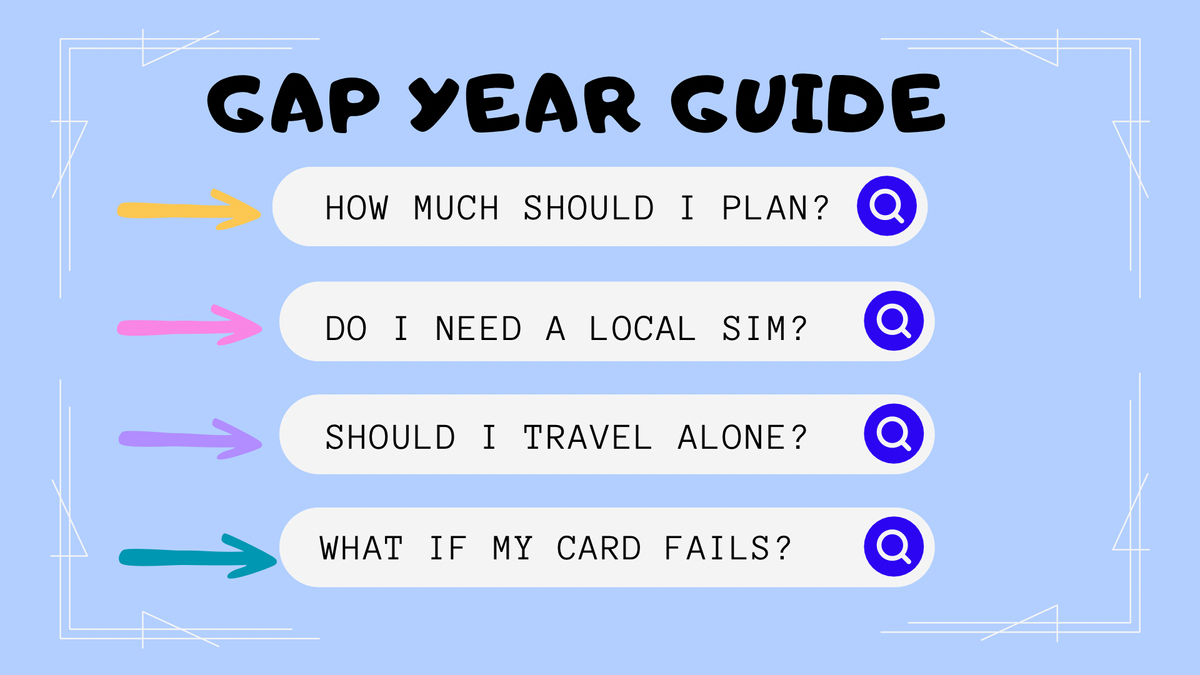Guide To Gap Years

Gap years can give fantastic opportunities to learn and experience. However, they can appear intimidating when you have all this time and don't know how to make the most of it! In https://eee-xplorer.com/easiest-gap-year-starters/ I discuss easy gap year starters to get going and below I will discuss things you must consider when planning and tips for while you are exploring.
Should I travel alone, a pair or a group?
One of the first pointers I personally advise is do not travel in a large group! Groups of friends are great for holidays but realistically if you are planning to do extended travelling it is nearly impossible. Booking accommodation becomes harder, freedom to move reduces, transportation becomes more challenging and overall it's just more complicated and subsequently more stressful! Don't even get started on the strain it can put on friendships within the group.
There can be benefits to traveling with one other person or maybe two. For example, you get to share your experiences with someone. The taxi fare might also be lower per person but don't rely on this as a benefit as depending on the location, some taxis charge per person rather than a total cost for the journey anyway. Should you end up travelling with someone else or in a bigger group remember you don't have to do everything together. Time apart stops you from cramping each other. It also allows you to explore and experience things you want that might not interest your travel partner/s.
How much planning should you do?
This is very personal to you as an individual and there is no right or wrong amount. It comes down to what you are comfortable with. If you are a more nervous (which is normal), travelling alone or travel is new to you I suggest doing more planning. This may include having flights booked that you can always change at a later date or having some accommodation sorted periodically. Don't get mixed up between planning and research. You should always do research on the area you are visiting. Essential research should include learning about the visa requirements, entry requirements, currency, vaccinations, appropriate insurance and precautions that are advised for the area you are visiting. Precautions could include understanding the appropriate clothing for the local culture and entry requirements may include proving you have enough funds and an outbound flights booked to leave the country after your visit. In the UK you can find advise for travelling to foreign countries on the government website.
Regardless of if you do decide to do any planning at all or not, remember your plans can change and you should be flexible. Most importantly... slow down! enjoy your time rather than pavement pounding and feeling exhausted. This will ware you out, make it less enjoyable and make you less adaptable to tolerate any challenges you have.
Tips for once you have arrived
- Be prepared for local scams. I suggest doing some research before you arrive but don't beat yourself up if you do get scammed we all make mistakes!
- Buy a local sim. if you are doing a longer trip I highly recommend buying a local sim. These are often purchased at local stores although some countries have the capability of ordering online in advance and collecting once you are in the area. I have also bought esims before when I was on a sailing boat and could not get to a local store. I used 'airalo' as at the time it had good reviews for the area I was in; but do your research and if you can get to a local store this is favourable. This is because esims can turn out to be complicated to set up and require you to have wifi to initially install. Once you know how to install them correctly they often also have top up options to fit your data usage. However esims can also be pretty expensive for limited data allowances/texts/calls compared to proper sims. Overall esims work for desperate occasions when you don't have a choice or only want local data for a short period.
- Keep your passport on you in a secure pocket
- Expect something to go wrong. Don't be alarmed just be prepared.
Be prepared for something going wrong!
You may have many questions like what if my bank card is cancelled? What if my purse gets stolen? What if I lose my passport? What if my flight is cancelled? I will discuss this more in a future post but below is a summary.
As mentioned, don't be alarmed and don't panic when something goes wrong, just be prepared. If you're panicking you will find it much harder to make decisions to move forward from the situation so stay as calm as you can! You can help yourself prepare for situations such as purse/wallet stolen and cards being declined by carrying spare cash. You should store your cash in various places around your various bags. Do not store this all in one place! It may also be an appropriate idea to carry a card reader with you as this may make re-activating any blocked cards possible/easier. Next, make sure you are aware of local numbers including the emergency number. (I recommend typing them into the notes app on your phone so you still have access even if you don't have internet or data.) Next, it is always good practise to carry your passport everywhere as identification. Make sure you keep it in a secure pocket where you can keep track of it as in some countries it is a legal requirement(yes!) to have it on your person at all times and makes any standard stop checks much easier. Of course should your passport go missing, get stolen or get damaged don't panic as you're not stuck in the country forever! Firstly you should cancel your passport with your home country and if stolen you should report this immediately to the local police. Next, depending on your home country and the area you are visiting, you will be able to apply for an emergency travel document. For British travellers information regarding this is again on the government website. Lastly cancelled flights are more frustrating than anything. You should contact the airline and your insurance company for advise.
It is good practise to have spare funds for any dilemmas that may occur. This should be separate from your budget amount and not be touched other than in emergencies.
Additionally it's good to be aware that countries may accept a different currency as well as the official local. For example, in some Caribbean countries although they use eastern Caribbean dollars as the local currency they also accept US dollars. Be aware exchange rates of the US dollars is often unreliable and the notes often have to be in immaculate condition for them to be accepted but... its still a backup and could get you out of trouble! My card was declined while trying to withdrawal cash in Grenada and in order to buy food until the issue was sorted, I had to use the spare US dollars I was carrying given the local store did not accept card.
